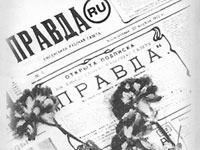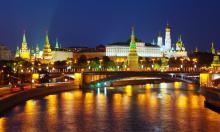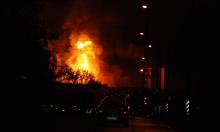Pravda was more powerful than fourth power
Everyone has parents and predecessors. Internet publication Pravda.Ru is an heir to the daily legal newspaper of workers, that had been published by V. I. Lenin since 5 May 1912. After the collapse of the USSR, the newspaper split into three separate publications, and one of those groups became online journal Pravda.Ru after 1998.

Ten years after the publication of the first edition of the Pravda newspaper, the Soviet Union started to celebrate this day as Day of Press. May 5th is also the birthday of the founder of the "most advanced teaching in the world" - Karl Marx. This is not the only circumstance that left an imprint on the publication. The newspaper Pravda, from the legal printing authority of the Bolshevik Party, after the tsarist regime, turned to the authority of the Central Committee and the Petersburg Committee of the Russian Social Democratic Workers' Party. Later, it became a press authority of the Communist Party of the Soviet Union. It was the most authoritative newspaper in the country.
After the collapse of the country, the newspaper of the Central Committee of the CPSU - Pravda - split into two parts. The split was masterminded by Greek sponsors, whom chief editor Gennady Seleznev brought with the approval from Russian communist leader Gennady Zyuganov.
Here is what the chairman of Board of Directors of Pravda.Ru Internet Holding, Vadim Gorshenin, wrote on the subject:
"After that, there was a long arbitration with the Greeks. The Russian group won the case and started to publish the Pravda. Then, Zyuganov quarreled with the Greeks, which led to the appearance of three Pravdas: the "Pravda" of the Communist Party (the red one), the Greek "Pravda Five" and the Russian "Pravda". Some time later, thanks to Zyuganov's cooperation with the administration of the Russian president in 1998, the Supreme Arbitration Court ruled to consider legitimate the Pravda newspaper that belonged to the Communist Party."
As a result, the Russian Pravda was closed, and the production of Pravda.Ru began.
" We, - continues Vadim Gorshenin (in 1987-1998 served as a correspondent of the office of youth, special correspondent, the head of the youth bureau and deputy chief editor of Pravda - ed.) - filed a lawsuit at the Arbitration Court, which we then won. The essence of the ruling was as follows: Pravda.Ru has the same right as the "Pravda" of the Communist Party, to use the name and the orders. Today, the Soviet Pravda has two heirs: Pravda.Ru and Pravda of the Communist Party.
Pravda.Ru was created by famous Pravdists (Pravda journalists) in 1999. Pravda of the Communist Party was registered in 1991 as a newly created publication. Obviously, our circulations are incomparable: Pravda.Ru has more than 200,000 readers daily. The Pravda of the Communist Party today is like a factory newspaper of AvtoVAZ in Soviet times. Pravda.Ru is published in three languages; its English version is ranked second in Russia after Russia Today. The Portuguese version takes the first place in Russian rankings."
The newspaper Pravda would often be accused of publishing the materials that reflect the position of the ruling party and the administration of the country. One may assume that officialdom in any other country could be in opposition! The main thing is that truth should be present on every page.
Yevgeny Primakov, a columnist and correspondent of Pravda in the Middle East (worked in Pravda from 1962 to 1970 - ed.), recalls:
"In Pravda, with Igor Belyaev, we wrote a series of articles about the defeat of Egypt in the Six Day War. We named the reasons for the defeat of Egypt - the new military bourgeoisie appeared, which began to operate in its own interests. Pravda published the material, but it came contrary to the idea of a non-capitalist path of development of socialist orientation ... One of the authors of the socialist orientation, Professor Ulyanovsky, took a dislike to us. He prepared a note, in which he accused us of all mortal sins. But we were lucky, because our ambassador was visiting Nasser (Gamal Abdel Nasser - Egyptian President in 1956-1970 - ed.), and he had been informed about our articles. Nasser said that we assessed the situation correctly. The ambassador handed it on to the top, and we took a breath of relief."
Primakov believes that freedom in the newspaper and understanding its role of the main newspaper of the country taught him to develop "a huge sense of responsibility for what you write, for every word in every sentence."
How could a journalist speak the truth during the "truthless era?"
Leading international journalist Vsevolod Ovchinnikov, who has been working in journalism for 40 of his 60 years (from 1951 to 1991, he worked as a member of "Pravda"), gave a brief answer to this question. During the 1950s, he had been representing the newspaper in Beijing for seven years; during the 1960s - for seven years in Tokyo; during the 1970s - for five years in London. For 13 years, he worked as the host of a popular Sunday television program "International Panorama." He is the author of over 20 books with a circulation of more than seven million copies.
Here is what Vsevolod Ovchinnikov said to the above-mentioned question:
"The cocoon that protected me from censorship was my expertise in problems of the Far East. The chiefs had the feeling that my knowledge of China and Japan was immeasurably larger than theirs. They preferred not to give me directions, not to commit a gaffe. I think that in our days, for creative independence, a journalist ought to know more than their bosses and even more than their audience do."
People of the older generation still remember how officials would react to letters published in Pravda. After all, an answer was supposed to be published in the next edition, in the section "Action Taken". During the years that went down in history as "perestroika" they tried to tried to impose a thesis on the society about the transformation of the press in the fourth power. Has it remained unrealized?
Writer Vladimir Lyubitsky, who left Pravda when working as a member of the editorial board and an editor of one of the most popular departments in the newspaper - the department of letters, said:
"The idea was rather silly, because the fourth power is not the press, but the public opinion, which the press expresses. One should not substitute law enforcement agencies, prosecutors and investigative committees. The meaning of the work of the press is to make the professional bodies work - the ones that receive money for it."
Science editor of Pravda in 1985-2001, Vladimir Gubarev, summed up the activities of the newspaper: "Pravda, like a mirror, was reflecting time. The Soviet times were great, tragic, insignificant and outstanding - one needs to simply understand that. The newspaper Pravda was always a place to work for those, who jailed and was jailed. Those, who executed and was executed, worked there too. You can not judge the past with standards of present day."
Igor Bukker
Pravda.Ru
Subscribe to Pravda.Ru Telegram channel, Facebook, RSS!





